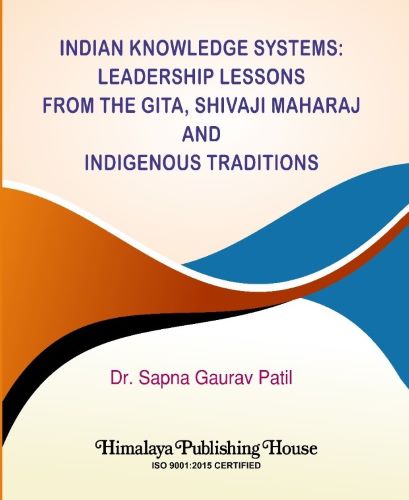Indian Knowledge Systems: Leadership Lessons from the Gita, Shivaji Maharaj, and Indigenous Traditions
This book is a unique blend of India’s timeless wisdom and modern management practice, crafted specifically for MBA students of the Indian Knowledge Systems (IKS) course under Savitribai Phule Pune University and similar programs nationwide.
It explores how India’s rich civilisational heritage—through the Bhagavad Gita, the leadership of Chhatrapati Shivaji Maharaj, and grassroots traditions like jugaad—provides a values-based, culturally rooted model for leadership and organisational management.
- The Bhagavad Gita inspires lessons in karma yoga, dharma, authentic action, and emotional balance, illustrated with examples from business leaders like Ratan Tata and Narayana Murthy.
- Shivaji Maharaj’s vision, governance, and ethical leadership demonstrate principles of resilience, inclusivity, and strategy directly applicable to today’s organisations.
- Comparisons between Indian and Western management approaches highlight the need for a hybrid model that balances efficiency with purpose and trusteeship.
- Jugaad and family-business traditions showcase the power of frugality, innovation, trust-based networks, and continuity in enterprise.
Each chapter integrates case studies, verses from the Gita, real-world applications, and Bloom’s Taxonomy-based assessment questions, ensuring both academic rigour and practical relevance. The book also includes past university exam papers to aid student preparation.
Aligned with NEP 2020 and the revised MBA curriculum (2024), this book fills a crucial gap as the first comprehensive textbook on IKS for management students. Beyond examinations, it equips learners with critical 21st century skills—ethical reasoning, resilience, emotional intelligence, and social responsibility—while grounding them in India’s cultural ethos.
An essential companion for MBA classrooms, leadership workshops, and personal growth, this book helps future managers lead with competence, character, and cultural rootedness.
Contents –
1. Leadership and Organisational Behaviour from Bhagavad Gita
1.1 Overview of the Bhagavad Gita
1.2 Historical and Cultural Context
1.3 Key Themes and Teachings
1.4 Role of Values, Ethics and Spirituality in Leadership and Organisational Culture
1.5 Motivation, Self-awareness and Self-management Principles
1.6 Developing Resilience and Emotional Intelligence
1.7 Inspiring and Motivating Teams
1.8 Team Dynamics and Conflict Resolution in Indian Traditions
1.9 Gita-based Decision-making Frameworks
1.10 Conflict Resolution Strategies
1.11 Servant Leadership Principles
1.12 Building High-performance Teams
1.13 Ethical Dilemmas and Decision-making
Caselet 1: Fraud at Punjab National Bank
Summary
References
Assessment Questions
2. Leadership and Governance Lessons from the Life of Chhatrapati Shivaji Maharaj
2.1 Historical Context
2.2 The Indian Knowledge System Triad
2.3 Leadership in Adversity
2.4 Leadership Styles and Effectiveness in Different Contexts
2.5 Shivaji Maharaj’s Strategic Vision and Planning
2.6 Innovation in Warfare and Governance
2.7 Principles of Governance in Shivaji’s Kingdom
2.8 Administrative Structures and Decision-making Processes
2.9 Efficient and Ethical Governance
2.10 Shivaji Maharaj as an Entrepreneur and Nation-builder
2.11 Economic Policies and Trade Strategies
2.12 Cultural values in Shivaji’s leadership
2.13 Balancing Tradition with Modernity in Leadership
2.14 Relevance of Shivaji Maharaj’s Leadership in Contemporary Management and Leadership
Summary
References
Assessment Questions
3. Comparative Analysis of Indian Knowledge Systems and Western Management Theories
3.1 Introduction
3.2 Overview of Indian Knowledge Systems (IKS)
3.3 Overview of Western Management Theories (WMT)
3.4 Philosophical Foundations and Cultural Contexts: IKS Vs WMT
3.5 Synergies and Integration of IKS and WMT
Case Study 1: Infosys
Case Study 2: Zomato
3.6 Life lessons by preachers — Gautam Buddha, Mahavir Jain, Sant Kabir
Summary
References
Assessment Questions
4. Indigenous Management Practices and Frameworks — Jugaad
4.1 Jugaad — Definition
4.2 Key Principles of Frugal Innovation
4.3 Historical Context and Cultural Significance in India
4.4 The Jugaad Mindset
4.5 Characteristics of a Jugaad Innovator
4.6 Comparison with Conventional Innovation Models
4.7 Importance of Resourcefulness and Creativity
4.8 Impact on Communities and Industries
4.9 Scaling Jugaad Innovations
4.10 Sustaining Jugaad Innovations
4.11 Frugal Innovation in Other Countries
4.12 Emerging Trends and Technologies in Frugal Innovation
4.13 Applications of Jugaad Innovation
Summary
References
Assessment Questions
5. Indian Knowledge Systems: Leadership Lessons from the Gita, Shivaji Maharaj, and Indigenous Traditions
5.1 Introduction
5.2 Historical Context of Family and Community Roles in Indian Business
5.3 Joint Family Systems
5.4 Community Networks and Business Ecosystems
5.5 Characteristics of Family-Owned Businesses in India
5.6 Leadership Styles in Indian Family Enterprises
5.7 Cooperative Movements in India
5.8 Social Enterprises and their Impact on Local Communities
5.9 Cultural Values and their Influence on Business Ethics
5.10 Role of Traditional Values in Contemporary Business Practices
5.11 Ethical Decision-making Influenced by Family and Community
5.12 Corporate Social Responsibility in the Indian Context
5.13 Community Engagement Strategies
5.14 Challenges Faced by Family and Community Businesses
5.15 Succession Planning, Leadership Transition, Conflict Resolution
5.16 Opportunities for Growth and Innovation
5.17 Adapting Traditional Practices to Modern Business Environments
5.18 Emerging Trends and their Impact on Family and Community Roles
5.19 Technology and Globalisation’s Influence on Traditional Practices
Summary
References
Assessment Questions
UNIVERSITY EXAMINATION QUESTION PAPERS






